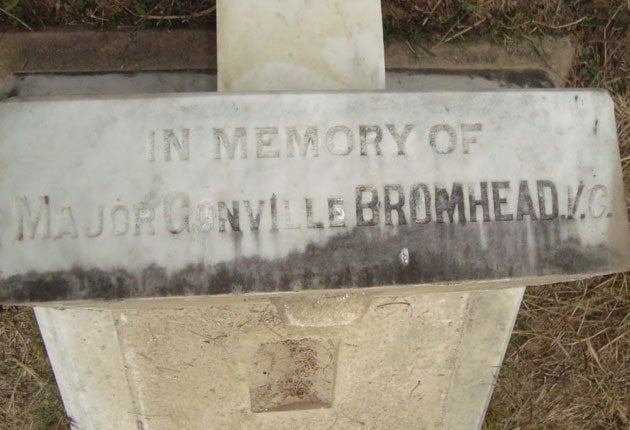Rorke's Drift hero's grave lies in ruins
Last resting place of soldier portrayed by Michael Caine in 'Zulu' lies mouldering and desecrated

Your support helps us to tell the story
From reproductive rights to climate change to Big Tech, The Independent is on the ground when the story is developing. Whether it's investigating the financials of Elon Musk's pro-Trump PAC or producing our latest documentary, 'The A Word', which shines a light on the American women fighting for reproductive rights, we know how important it is to parse out the facts from the messaging.
At such a critical moment in US history, we need reporters on the ground. Your donation allows us to keep sending journalists to speak to both sides of the story.
The Independent is trusted by Americans across the entire political spectrum. And unlike many other quality news outlets, we choose not to lock Americans out of our reporting and analysis with paywalls. We believe quality journalism should be available to everyone, paid for by those who can afford it.
Your support makes all the difference.The bravery of Lieutenant Gonville Bromhead during the defence of the mission station at Rorke's Drift in the Zulu War of 1879 has come to symbolise courage in the face of overwhelming odds.
But 118 years after the death of this British hero– famously portrayed by Michael Caine in the film Zulu – his grave at Allahabad, India, lies in ruins – the headstone broken on the ground, surrounded by animal dung and overgrown grass.
For his gallantry at Rorke's Drift, Lt Bromhead, of the 2nd Battalion, 24th Foot (later the South Wales Borderers), was awarded the Victoria Cross, the highest military decoration for valour – and one of a record 11 VCs awarded to the mission's defenders. He helped to command around 140 soldiers, of whom 36 were sick or injured, against about 4,500 Zulu warriors intent on destroying the post and killing the garrison. The battle raged for 12 hours before the Zulu attack was abandoned.
The citation for his VC stated: "Lt Bromhead shared the command of the defenders of the post with Lt JRM Chard of the Royal Engineers, setting a fine example and conducting himself with great gallantry in most trying circumstances."
Promoted to Major, Bromhead went on to serve in Burma during the 1880s before dying of typhoid at Camp Dabhaura, Allahabad, India on 9 February 1892.
Lord Roper, chair of the All-Party Parliamentary War Graves and Battlefields Heritage Group, said last night he would take urgent action to restore the resting place of one of Britain's best-known military heroes. "I will be contacting the British High Commission in Delhi to ask whether they can do anything about it. It is very sad that the grave of someone of such historic distinction is in such a condition," he said.
Brigadier David Bromhead, the great, great nephew of the Rorke's Drift hero said yesterday: "It's sad, and I hadn't realised it had got that bad. It doesn't surprise me, I'm afraid. Maybe it's a heartless thing to say, but you can't really blame anyone at that end – I suppose it's the inevitable result of the passing of time. I don't know quite how one deals with something like that, unless you employ someone to maintain it locally. I'll talk to the regiment about it to see what can be done."
The British Association for Cemeteries in South Asia (BACSA) confirmed that the matter has now been referred to the Indian army. Dr Rosie Llewellyn-Jones of BACSA said: "I am very confident that this grave will be restored in the very near future."
Join our commenting forum
Join thought-provoking conversations, follow other Independent readers and see their replies
Comments